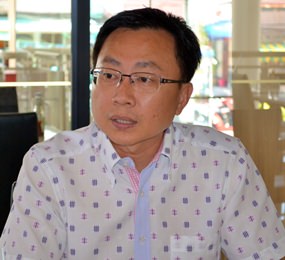The imposition of military rule will have short-term negative impacts on Pattaya’s tourist industry, but could be the “light at the end of the tunnel” for the kingdom’s long-term political crisis, the president of the Pattaya Business & Tourism Association said.
In an interview, PBTA head Sinchai Wattanasartsathorn said he disapproves of the military coup, but that everyone must accept it as “there is no other way out for the kingdom.”
 PBTA President Sinchai Wattanasartsathorn says the coup might provide the “light at the end of the tunnel.”
PBTA President Sinchai Wattanasartsathorn says the coup might provide the “light at the end of the tunnel.”
The coup “is like opening a tunnel offering two perspectives, one of which is that people will finally see the light at the end of the tunnel,” Sinchai said. “And this is precisely why we must accept the political situation as it is: In order to figure a way to peace, to the light at the end of the tunnel, together the country can return to normal as fast as possible.”
The coup, however, has dealt yet another blow to a dismal year for hotels and tourism-related businesses in the city, he said. Tourist levels have dropped 20 percent since April and hotel bookings are down 50 percent year-on-year. Asian tourists have all but disappeared and serious travel warnings from the U.S. and other European countries are hurting arrivals from those regions, Sinchai said.
The PBTA boss said the Russian market is holding up best and he expects only small impacts on the European market, as tourists there are well informed about the situation in Thailand and were the first tourists to discover Pattaya. Hence, they’ve seen coups and political unrest before.
Hong Kong, however, has led the way in the Asian-market decline, issuing its top-level warning against visiting the kingdom. Politics have scared away tourists who still remember the devastating airport shutdown in 2008 and the deadly violence of 2010.
“Thirty years ago, Pattaya never had a high or a low season. There were tourists all-year round,” the PBTA chief recalled. “But lately, the number of tourists have been decreasing every year.”
Part of the problem is the over-abundance of new hotels, condos and guesthouses. While once hotels could depend on occupancy levels of 50-60 percent in May, bookings are now scattered over a much-larger base, making it harder for hotels to survive, he said.
There is hope among tourism-industry executives that the opening of the ASEAN Economic Community next year will spur an increase in business. And tourism officials are working hard to make that happen, he said.
The Tourism Authority of Thailand will showcase Pattaya at the ITB Asian show in Singapore in October and at other shows in Indonesia and Myanmar.
“If Thailand tourism can pull at least 30 percent of the ASEAN market, it will be a good start,” Sinchai said. For that to happen, however, not only does Pattaya have to fix its ongoing infrastructure issues, but normalcy must return to the political landscape.
“The answer lies in politics,” he said. “If politics are peaceful, everything will return to normal.”




